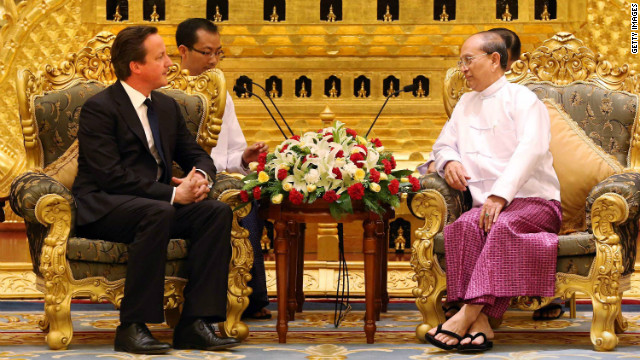
British Prime Minister David Cameron arrived in Myanmar Friday on the first visit by a high-profile Western leader to the nation in decades.
Speaking alongside pro-democracy leader Aung San Suu Kyi in Yangon, he said that sanctions should be suspended, rather than lifted entirely, to encourage further progress in democracy and human rights in Myanmar.
"We must respond with caution, with care. We must always be skeptical and questioning, because we want to know these changes are irreversible," Cameron said.
The sanctions to be suspended will not include the embargo on arms sales, he said.
Suu Kyi said she supported the suspension of sanctions because it acknowledged the role played by Myanmar's President Thein Sein and other reformers in bringing about change.
The suspension also makes it clear that sanctions could be reimposed if reforms are obstructed, she said.
Cameron earlier met with the president during a brief stop in Naypyidaw, the Southeast Asian country's capital.
Cameron's visit to Myanmar, a former British colony also known as Burma, comes two weeks after Suu Kyi's party won dozens of seats in elections and marks the latest step towards international rehabilitation for Myanmar.
Cameron is the first British prime minister to visit the country in more than 60 years, Downing Street said.
British Ambassador to Burma Andy Heyn said the visit was "a clear statement of the British government's intention to support the president and Daw Aung San Suu Kyi" as they continue the long process of reform.
Until very recently, the prospect of such a high-level visit was "so far-fetched as to be absurd," Heyn wrote in a piece published on the UK Foreign Office website ahead of the trip.
Cameron also met with British Embassy officials in Yangon.
Myanmar's authoritarian military rulers have begun loosening their grip on power, after decades in which dissent was stifled and freedoms severely limited.
In the past 12 months, the government has pardoned hundreds of political prisoners, secured a ceasefire with Karen rebels and agreed to negotiate with other ethnic rebel groups.
U.S. Secretary of State Hillary Clinton described the by-elections that took place April 1 as "an important step in Burma's democratic transformation." Myanmar is sometimes referred to as Burma. Suu Kyi's National League for Democracy, or NLD, won 43 of the 44 seats it contested.
The Obama administration is now taking several significant steps to normalize relations with the country, including facilitating travel to the United States for select government officials and members of parliament.
Clinton visited Myanmar in December -- a historic trip marking the first time a secretary of state had been to the country in more than 50 years -- and British Foreign Secretary William Hague visited the following month.
While control of parliament will not change despite the opposition's strong performance in the by-elections, the result nonetheless gives the NLD and Suu Kyi a notable presence in the country's parliament.
Suu Kyi, who was elected in the constituency of Kawhmu, has been invited to attend her first session of parliament in Naypyidaw on April 23, said U Tin Kyaw, a senior NLD official.
Myanmar's legislature has 664 seats, more than 80% of which are still held by lawmakers aligned with the military-backed ruling party, the Union Solidarity and Development Party (USDP).
Suu Kyi, 66, led her party to a landslide victory the previous time Myanmar held multiparty elections, in 1990. But the junta ignored the results and placed her under house arrest.
Released in November 2010, Suu Kyi was allowed to crisscross the country to rally support for the NLD at the elections.
Aucun commentaire:
Enregistrer un commentaire
welcome